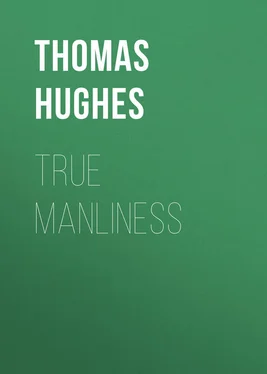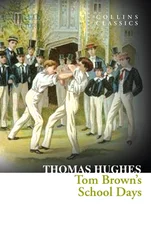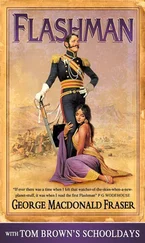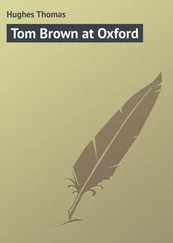Thomas Hughes - True Manliness
Здесь есть возможность читать онлайн «Thomas Hughes - True Manliness» — ознакомительный отрывок электронной книги совершенно бесплатно, а после прочтения отрывка купить полную версию. В некоторых случаях можно слушать аудио, скачать через торрент в формате fb2 и присутствует краткое содержание. ISBN: , Жанр: foreign_prose, на английском языке. Описание произведения, (предисловие) а так же отзывы посетителей доступны на портале библиотеки ЛибКат.
- Название:True Manliness
- Автор:
- Жанр:
- Год:неизвестен
- ISBN:http://www.gutenberg.org/ebooks/52534
- Рейтинг книги:5 / 5. Голосов: 1
-
Избранное:Добавить в избранное
- Отзывы:
-
Ваша оценка:
- 100
- 1
- 2
- 3
- 4
- 5
True Manliness: краткое содержание, описание и аннотация
Предлагаем к чтению аннотацию, описание, краткое содержание или предисловие (зависит от того, что написал сам автор книги «True Manliness»). Если вы не нашли необходимую информацию о книге — напишите в комментариях, мы постараемся отыскать её.
True Manliness — читать онлайн ознакомительный отрывок
Ниже представлен текст книги, разбитый по страницам. Система сохранения места последней прочитанной страницы, позволяет с удобством читать онлайн бесплатно книгу «True Manliness», без необходимости каждый раз заново искать на чём Вы остановились. Поставьте закладку, и сможете в любой момент перейти на страницу, на которой закончили чтение.
Интервал:
Закладка:
“So things went on for some years during which I managed to maintain my growing family without dropping my work for the Associations. We had migrated to Wimbledon, for health’s sake, where we built a house side by side with one of the other Promoters, which had one large room common to both houses, the subject of much chaff and fun to our visitors and acquaintance. Our garden was also in common, and both arrangements, I think, answered well.
“About this time Maurice became convinced that if Associations of working people were to succeed, the men must be better educated in the highest sense. So he set to work to establish the Workingmen’s College, of which he was the first and I am the present Principal. It is a very noteworthy institution, at which, by the way, Emerson and Goldwin Smith, besides Stanley, Kingsley, Huxley, and other eminent Englishmen, have delivered opening addresses, at the beginning of the academical year, in October.
“I found it at first very hard to discover my mission at the college. I tried lectures on the law of combination and association, but they did not draw, and all the other classes for which I was competent, were filled by much better teachers from amongst our number. So, noting how badly set up the men were with round shoulders, and slouching gait, and how much they needed some strong exercise to supple them, I started a boxing class, and had some horizontal and parallel bars put up in the back-yard. These proved a great success, and at last it became clear to me, that all my Oxford time spent on such matters had not been thrown away. In connection with the boxing and gymnastic classes, we started social gatherings for talk and songs, over a cup of tea, which also were wonderfully successful. I remember Hawthorne coming to one of them; brought by his friend, H. Bright, of Liverpool, and quite losing his shyness and reserve for the evening.
“By this time we had a boy of eight, and, thinking over what I should like to say to him before he went to school, I took to writing a story as the easiest way of bringing out what I wanted. It was done mainly in the long vacation of 1856, but wasn’t published till early in the next year, and made such a hit that the publishers soon betrayed the secret, and I became famous!
“Whereupon arose again the professional bugbear, now set at rest for years. I had managed to get over and live down Christian Socialism, but who on earth would bring business to a successful author! I considered whether I shouldn’t throw over Lincoln’s Inn and take to writing, but decided that the law was best for me, and determined to stop writing. This good resolution held for two years, when the Berkshire festival of scouring the White Horse, (an old Danish or Saxon, certainly Pagan figure, still left on our chalk-hills,) came round, and my old country friends made such a point of having an account of it from me that I gave in and wrote my book No. 2.
“By this time my clients had become case-hardened, and finding no particular ill effects from my previous escapades, I gave in in a weak moment to a tempting offer of Macmillan’s, and wrote ‘Tom Brown at Oxford,’ for his magazine. Moreover, I had now made a plunge into public life, and was one of the leaders of a semi-political party. This is how it came about: There had been roused in me lively sympathies with the Abolitionists, and I had followed eagerly the progress of events through the Fugitive Slave, and Free Soil agitations. There was no warmer sympathizer with Garrison and John Brown and Levi Coffin, in England; so when the Lincoln election came, and South Carolina led off the seceding states with jubilant applause of society in England, I went at once fiercely into the other camp. You may judge of the difficulty of getting our public men of note to take active sides with the North (tho’ many of them didn’t conceal their sympathy, and were ready to speak in Parliament, and write,) by the fact that I was about the most prominent speaker at the first great public meeting, which was held in London. This proved to be such an extraordinary success, that there was no further effort on the part of the jingoes (that name hadn’t yet been invented, but it was precisely the same party,) to demonstrate publicly in the metropolis. In other centres there was need of such work, and I went to Birmingham and Liverpool to speak and deliver lectures on the war and its causes and issues. It was supposed that there was to be a row at the latter place, which was the stronghold of the Rebels; but all went off quietly.
“It was mainly in consequence of these doings that I was asked by the working folk in South London to stand for Lambeth in 1865. I did so, and was brought in triumphantly at the head of the Poll, and almost all the expense paid by subscription. From that time I gradually gave up legal business, and in 1868 took silk, as it is called, i. e. , became a Queen’s Counsel. In 1869 I wrote ‘Alfred the Great’ for Macmillan’s Sunday Series. I now made it my chief business to attend to Social-Political questions in Parliament; sat on two Trades Unions Commissions; got amendments to the Industrial and Friendly Societies Acts through the House, but never took to party politics.
“In 1870, as I hope you remember, I paid my delightful visit to America.
“In 1872 I lost my dear eldest brother, and soon after wrote the memoir of him for my family. Maurice also died, and I became Principal of the Workingmen’s College.
“Before the next election (1874) the Co-operative question had come to the front. The success of the Upper Class London Supply Societies [copies of our working-class Associations in their main principle and features] had roused the tradesmen throughout the country. I was a candidate for Marylebone, and was fiercely opposed by the tradesmen, and supported by the professional and working classes. There were three Liberal candidates for only two seats, so it was agreed to refer it to the Attorney General to say who should retire, and he decided that I had the worst chance of winning the seat (on one-sided and insufficient evidence, as my supporters maintained, and I think rightly). I therefore retired, and got no chance of entering that Parliament. For by this time the Trades Protection Society had been organized, to fight against neither small nor great, but only against those accursed revolutionists who had supported the Co-operative movement, and refused to flinch from it.
“So it happened that I was again thrown out at the election this year. I had consented, on the unanimous and unsolicited request of the Liberal party in Salisbury, to stand there, and all went well till just before the election, when the Trades Protective people permitted the party organization to throw me over. I doubt if I shall ever return to the House, as my views on the Church question make me an almost hopeless candidate in the North of England, and my support of Co-operation a perfectly hopeless one at present in the South. I care, however, very little about it, having plenty to do outside in keeping irons hot, especially that most interesting of all my irons, the Tennessee settlement, which I hope to keep very hot indeed, and look upon as about the most hopeful of the many New Jerusalems which have attracted me during my pilgrimage. I am off to open Chapter II. of that Romance [Chapter I., the getting the titles clear, buying the land, &c., having taken some two years.] on the 12th of next month, and I can’t tell you how much my heart is in it.
“And so end my confessions. The only other points of interest, omitted above, are the publication of the ‘Old Church,’ in 1877, when the disestablishment movement began to get serious, and ‘The Manliness of Christ,’ this Spring, (1880), which latter has been already republished on your side in four different forms; and lastly, my share in the Volunteer movement, which I joined at its start in 1859. The Workingmen’s College raised a corps of two companies at once, of which, after serving for a few weeks as private, I was made Captain. It soon swelled into a regiment, the 19th Middlesex, of which I became Colonel, and served in it twelve years.”
Читать дальшеИнтервал:
Закладка:
Похожие книги на «True Manliness»
Представляем Вашему вниманию похожие книги на «True Manliness» списком для выбора. Мы отобрали схожую по названию и смыслу литературу в надежде предоставить читателям больше вариантов отыскать новые, интересные, ещё непрочитанные произведения.
Обсуждение, отзывы о книге «True Manliness» и просто собственные мнения читателей. Оставьте ваши комментарии, напишите, что Вы думаете о произведении, его смысле или главных героях. Укажите что конкретно понравилось, а что нет, и почему Вы так считаете.












